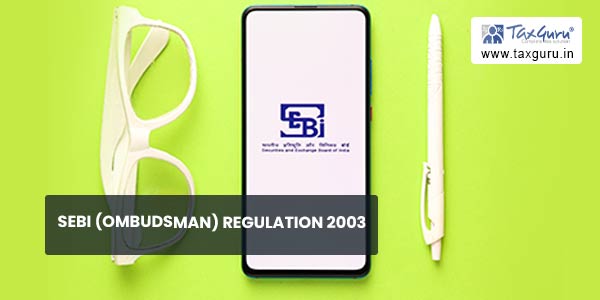Ombudsman is a concept which was invented in sweden and thereafter was adopted in India. Ombudsman in literal sence means an independent person who is appointed to hear and act upon citizen’s complaints about government services . For example any bank , insurance company or any other organisation can appoint ombudsman for their customers
Same way Sebi has made provisions for Ombudsman which looks after the complaints which are recieved by any investor againts listed company or intermediary which is registered with Sebi
Sebi has issued SEBI (Ombudsman) Regulation 2003 which regulates the functioning of Ombudsman
As per regulation 2(l) of SEBI(Ombudsman) Regulation 2003, Ombudsman means any person appointed under regulation 3 of these regulations and unless the context requires , includes stipendary Ombudsman
Regulation 2 (n) of these regulations defines stipendary Ombudsman as a person which is appointed under regulation 9 for the purpose of acting as Ombudsman in respect of specific matters or all the matters in specific territorial jurisdiction and for which he may be paid such expences , honorarium , sitting fees as may be determined by Sebi from time to time.
Any person who is having any grievance against any listed company or intermediary can approach ombudsman within whose jurisdiction the registered office of listed company pr intermediary against whom complaint is to be filed is located
Before making complaint to Ombudsman about any grivenace against any listed company or intermediary first a written representation is required to be made to the concerned entity or listed company against whom you have a complaint
Ombudsman will accept the complaint in case where the complaint is not solved by concerned entity or intermediary within one month of making representation to the concrened entity or intermediary.
Power and functions of Ombudsman
There are certain functions and powers given to Ombudsman under this regulations which are discussed as follows

- Ombudsman has the power to recieve any complaint which is specified under regulation 13 against any intermediary or listed company
- On reciving such complaint it is duty of Ombudsman to resolve the dispute with amicable settelment.
- In case if amicable settelment is not possible Ombudsman has the power to adjudicate such matter.
Grounds on which complaints can be made to Ombudsman
A Person can lodge complaint to Ombudsman against any intermediary or listed entity on following grounds.
- Non receipt of share certificate
- Non receipt of debenture certificate
- Non receipt of unit certificate
- Non receipt of refund of allotment money in case of non allotment
- Non receipt of dividend to shareholders
- Non receipt of annual statements or annual reports relating to portfolio
- Any grievance in respect of issue or dealing in securities against an intermediary or a listed company
Awards by Ombudsman
After adjudication of the case the award given by ombudsman shall be final and binding on the parties
Any party aggrieved by the award given by Ombudsman can make a petition to SEBI , provided party filling the petition has to deposite with SEBI 75% of the amount mentioned in award given by Ombudsman.
SEBI may review the award and pass an order as it may deem fit within 45 days from filling of petition




